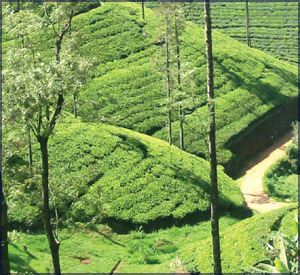|
Business Tea Report
Bartleets weekly tea surveillance report up to
December 5:
Growth in demand from Middle-East, Russia
Once again the quantity of tea arriving at the Colombo Auction dipped
significantly to 5.050 mkg as compared with 5.222 m kg in the previous
sale. This weeks Ex-estate crops too drop to 0.589 m kg as compared with
0.646 m kg last week.
Ex-Estate market was strong as a result of comparatively few numbers
of sales scheduled to December. Another factor driving the market
upwards could be the scarcity of good crops from high grown areas as
compared to recent times. Exporters to Russia were particularly active
whilst Japan and UK showed considerable interest.

In the Tippy market, buyers from Iran, Dubai and CIS were very active
whilst buyers from Turkey and Saudi Arabia were selective on their
buying.
In the leafy-grade segment, the artificial market which was created
last week for the OP and OPA grades did not last long as it collapsed
this week. But the Pekoe grade gained from last week.
The relationship between two grades Pekoe and OPA was visible. When
one grade was loosing the other gained. This has been the trend for the
last couple of months and indications are that whilst the OPA loses its
demand the Pekoes will overtake OPA grades in the future sales.
The tea industry is currently struggling to sustain itself and
re-invest for future development and growth according to some
commentators. These issues have come into question following a recent
wage increase for plantation workers.
The profitability of the industry rests heavily on the movement of
global market prices and production costs. Due to emergence of low cost
global producers like Kenya, Indonesia and Vietnam, the local tea
industry is trying hard to stay afloat and make ends meet.

As the wages account for 60 per cent of production costs, the impact
this wage hike means an annual additional burden of almost Rs. 2 billion
which has to be borne by the Plantation Companies without any
reciprocator gains in productivity.
London-based The Independent recently released its review of the top
five factory hotels in the world with Sri Lanka’s first theme hotel, The
Tea Factory being selected as one of them. The balance four hotels hail
from Spain, Greece, Italy and Australia.
Demand from the Middle East and Russia has seen a considerable
growth, tea prices at the weekly auctions in Colombo went up by over 40
per cent from last year which is a record high.
During the 12 months to September average tea prices climbed 42 per
cent to a new height. The main factor is due to the rising oil prices
that have strengthened the main buyers, which are Middle East and
Russia.
Nevertheless, the falling production also contributed to rising
prices, in the first nine months this year tea production dipped seven
percent compared to the same time last year.
The increase in the price has raised a question that the current
Ceylon tea buyers will look at low cost markets like India and Vietnam
instead as these countries also produce orthodox black tea, which is
consumed by over 70 per cent of the tea drinkers worldwide.
Sri Lankan plantation companies with low grown teas and oil palm are
reaping the benefits of record prices. As Namunukula is equipped with
all three main crops - Palm oil, rubber and low grown tea, their profits
have hit 213 million from 83 million ended six months period year on
year.
Other plantations stocks sought after by investors are Hapugastanne,
Watawala and Udapussellawa.
This is due to the increase of oil prices which has led to a hike in
consumer incomes of the main oil exporting countries of the Middle East
and Russia, spurring the demand for their choice of tea - the low grown
crops.
Meanwhile, tea bag exporter Ceylon Tea Services Ltd has reported a
14.2 per cent or Rs. 274 million increase in profits with sales rising
56 per cent to 1.4 billion rupees for the third quarter, according to
interim results sent to the CSE.
The branded tea has penetrated the markets in Australia, New Zealand,
Eastern Europe and the CIS countries as well as having launched in the
United Kingdom. With reference to the weekly surveillance of the 19
plantation stocks, seven were up in value, 11 were down and one reported
static. Elpitiya, Malwatte and Watawala were the main gainers week on
week reporting 29, 19 and 8 per cent respectively. |

